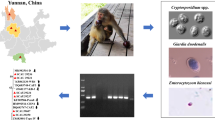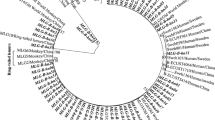Abstract
The western chimpanzee (Pan troglodytes verus), a subspecies of the common chimpanzee, is currently listed as Critically Endangered. Human-driven habitat loss and infectious diseases are causing dramatic chimpanzee population declines and range contractions that are bringing these primates to the brink of extinction. Little information is currently available on the occurrence of diarrhoea-causing enteric protist species in chimpanzees in general, and in western chimpanzees in particular, or on the role of humans as a potential source of these infections. In this prospective molecular epidemiological study, we investigated the presence, genetic variability, and zoonotic potential of enteric protists in faecal samples from western chimpanzees (n = 124) and humans (n = 9) in Comoé National Park, Côte d'Ivoire. Parasite detection and genotyping were conducted by using polymerase chain reaction (PCR) and Sanger sequencing. The protist species found in the chimpanzee samples were Entamoeba dispar (14.5%), Blastocystis sp. (11.3%), Giardia duodenalis (5.8%), Troglodytella abrassarti (2.5%) and Cryptosporidium hominis (0.8%). The protist species found in the human samples were G. duodenalis (22.2%) and Blastocystis sp. (11.1%). Entamoeba histolytica, Enterocytozoon bieneusi, and Balantioides coli were undetected in both chimpanzee and human samples. Sequence analyses revealed the presence of Blastocystis subtype (ST) 1 (alleles 4 and 8) and ST3 (allele 24) in chimpanzees, and ST3 (allele 52) in humans. ST1 allele 8 represents a chimpanzee-adapted Blastocystis genetic variant. Cross-species transmission of pathogenic enteric protists between chimpanzees and humans might be possible in Comoé National Park, although the frequency and extent of zoonotic events remain to be fully elucidated.
Similar content being viewed by others
References
Breton J, Bart-Delabesse E, Biligui S et al (2007) New highly divergent rRNA sequence among biodiverse genotypes of Enterocytozoon bieneusi strains isolated from humans in Gabon and Cameroon. J Clin Microbiol 45:2580–2589. https://doi.org/10.1128/JCM.02554-06
Buckholt MA, Lee JH, Tzipori S (2002) Prevalence of Enterocytozoon bieneusi in swine: an 18-month survey at a slaughterhouse in Massachusetts. Appl Environ Microbiol 68:2595–2599. https://doi.org/10.1128/aem.68.5.2595-2599.2002
Deere JR, Parsons MB, Lonsdorf EV et al (2019) Entamoeba histolytica infection in humans, chimpanzees and baboons in the Greater Gombe Ecosystem, Tanzania. Parasitology 146:1116–1122. https://doi.org/10.1017/S0031182018001397
Drakulovski P, Bertout S, Locatelli S et al (2014) Assessment of gastrointestinal parasites in wild chimpanzees (Pan troglodytes troglodytes) in southeast Cameroon. Parasitol Res 113:2541–2550. https://doi.org/10.1007/s00436-014-3904-y
Formenty P, Boesch C, Wyers M et al (1999) Ebola virus outbreak among wild chimpanzees living in a rainforest of Côte d’Ivoire. J Infect Dis 179:S120–S126. https://doi.org/10.1086/514296
Gilardi KV, Gillespie TR, Leendertz FH et al (2015) Best practice guidelines for health monitoring and disease control in great ape populations. Primate Specialist Group, IUCN, SSC, Gland, Switzerland 56:56
Gillespie TR, Morgan D, Deutsch JC et al (2009) A legacy of low-impact logging does not elevate prevalence of potentially pathogenic protozoa in free-ranging gorillas and chimpanzees in the Republic of Congo: logging and parasitism in African apes. EcoHealth 6:557–564. https://doi.org/10.1007/s10393-010-0283-4
Gillespie TR, Lonsdorf EV, Canfield EP et al (2010) Demographic and ecological effects on patterns of parasitism in eastern chimpanzees (Pan troglodytes schweinfurthii) in Gombe National Park, Tanzania. Am J Phys Anthropol 143:534–544. https://doi.org/10.1002/ajpa.21348
Gonzalez-Moreno O, Hernandez-Aguilar RA, Piel AK et al (2013) Prevalence and climatic associated factors of Cryptosporidium sp. infections in savannah chimpanzees from Ugalla, western Tanzania. Parasitol Res 112:393–399. https://doi.org/10.1007/s00436-012-3147-8
Gutiérrez-Cisneros MJ, Cogollos R, López-Vélez R et al (2010) Application of real-time PCR for the differentiation of Entamoeba histolytica and E. dispar in cyst-positive faecal samples from 130 immigrants living in Spain. Ann Trop Med Parasitol 104:145–149. https://doi.org/10.1179/136485910x12607012373759
Howells ME, Pruetz J, Gillespie TR (2011) Patterns of gastro-intestinal parasites and commensals as an index of population and ecosystem health: the case of sympatric western chimpanzees (Pan troglodytes verus) and guinea baboons (Papio hamadryas papio) at Fongoli, Senegal. Am J Primatol 73:173–179. https://doi.org/10.1002/ajp.20884
Hublin JSY, Maloney JG, Santin M (2021) Blastocystis in domesticated and wild mammals and birds. Res Vet Sci 135:260–282. https://doi.org/10.1016/j.rvsc.2020.09.031
Humle T, Boesch C, Campbell G, et al. (2016) Pan troglodytes ssp. verus. The IUCN Red List of Threatened Species 2016: e.T15935A102327574. https://doi.org/10.2305/IUCN.UK.2016-2.RLTS.T15935A17989872.en Accessed 6 Aug 2021.
Ježková J, Limpouchová Z, Prediger J, et al. (2021) Cryptosporidium myocastoris n. sp. (Apicomplexa: Cryptosporidiidae), the species adapted to the nutria (Myocastor coypus). Microorganisms 9:813. https://doi.org/10.3390/microorganisms9040813
Jirků-Pomajbíková K, Čepička I, Kalousová B et al (2016) Molecular identification of Entamoeba species in savanna woodland chimpanzees (Pan troglodytes schweinfurthii). Parasitology 143:741–748. https://doi.org/10.1017/S0031182016000263
Kaur T, Singh J, Tong S et al (2008) Descriptive epidemiology of fatal respiratory outbreaks and detection of a human-related metapneumovirus in wild chimpanzees (Pan troglodytes) at Mahale Mountains National Park, western Tanzania. Am J Primatol 70:755–765. https://doi.org/10.1002/ajp.20565
Kooriyama T, Hasegawa H, Shimozuru M et al (2012) Parasitology of five primates in Mahale Mountains National Park, Tanzania. Primates 53:365–375. https://doi.org/10.1007/s10329-012-0311-9
Köster PC, Lapuente J, Pizarro A, et al. (2021a) Presence and genetic diversity of enteric protists in captive and semi-captive non-human primates in Côte d'Ivoire, Sierra Leone, and Peru. Acta Trop (in press)
Köster PC, Renelies-Hamilton J, Dotras L, Llana M, Vinagre-Izquierdo C, Prakas P, Sneideris D, Dashti A, Bailo B, Lanza M, Jiménez-Mejías A, Muñoz-García C, Muadica AS, González-Barrio D, Rubio JM, Fuentes I, Ponce-Gordo F, Calero-Bernal R, Carmena D (2021b) Molecular detection and characterization of intestinal and blood parasites in wild chimpanzees (Pan troglodytes verus) in Senegal. Animals 11(11):3291. https://doi.org/10.3390/ani11113291.
Kühl HS, Sop T, Williamson EA et al (2017) The Critically Endangered western chimpanzee declines by 80%. Am J Primatol. https://doi.org/10.1002/ajp.22681
Lalle M, Pozio E, Capelli G et al (2005) Genetic heterogeneity at the beta-giardin locus among human and animal isolates of Giardia duodenalis and identification of potentially zoonotic subgenotypes. Int J Parasitol 35:207–213. https://doi.org/10.1016/j.ijpara.2004.10.022
Lapuente J (2021) The chimpanzees of the Comoé National Park, Ivory Coast. Status, distribution, ecology and behaviour. Doctoral thesis. https://doi.org/10.25972/OPUS-22318
Li W, Feng Y, Santin M (2019) Host specificity of Enterocytozoon bieneusi and public health implications. Trends Parasitol 35:436–451. https://doi.org/10.1016/j.pt.2019.04.004
Lilly AA, Mehlman PT, Doran D (2002) Intestinal parasites in gorillas, chimpanzees, and humans at Mondika Research Site, Dzanga-Ndoki National Park, Central African Republic. Int J Primatol 23:555–573. https://doi.org/10.1023/A:1014969617036
Maloney JG, Jang Y, Molokin A (2021) Wide genetic diversity of Blastocystis in white-tailed deer (Odocoileus virginianus) from Maryland, USA. Microorganisms 9:1343. https://doi.org/10.3390/microorganisms9061343
Mbaya AW, Udendeye UJ (2011) Gastrointestinal parasites of captive and free-roaming primates at the Afi Mountain Primate Conservation Area in Calabar, Nigeria and their zoonotic implications. Pak J Biol Sci 14:709–714. https://doi.org/10.3923/pjbs.2011.709.714
McLennan MR, Hasegawa H, Bardi M (2017) Gastrointestinal parasite infections and self-medication in wild chimpanzees surviving in degraded forest fragments within an agricultural landscape mosaic in Uganda. PLoS ONE 12:e0180431. https://doi.org/10.1371/journal.pone.0180431
Medkour H, Amona I, Laidoudi Y et al (2020) Parasitic infections in African humans and non-human primates. Pathogens 9:561. https://doi.org/10.3390/pathogens9070561
Menu E, Davoust B, Mediannikov O et al (2021) Occurrence of ten protozoan enteric pathogens in three non-human primate populations. Pathogens 10:280. https://doi.org/10.3390/pathogens10030280
O’Donnell LJ, Virjee J, Heaton KW (1990) Detection of pseudodiarrhoea by simple clinical assessment of intestinal transit rate. BMJ 300:439–440. https://doi.org/10.1136/bmj.300.6722.439
Parsons MB, Travis D, Lonsdorf EV et al (2015) Epidemiology and molecular characterization of Cryptosporidium spp. in humans, wild primates, and domesticated animals in the Greater Gombe Ecosystem. Tanzania. PLoS Negl Trop Dis 9:e0003529. https://doi.org/10.1371/journal.pntd.0003529
Petrášová J, Uzlíková M, Kostka M et al (2011) Diversity and host specificity of Blastocystis in syntopic primates on Rubondo Island, Tanzania. Int J Parasitol 41:1113–1120. https://doi.org/10.1016/j.ijpara.2011.06.010
Pomajbíková K, Petrželková KJ, Profousová I et al (2010) Discrepancies in the occurrence of Balantidium coli between wild and captive African great apes. J Parasitol 96:1139–1144. https://doi.org/10.1645/GE-2433.1
Pomajbíková K, Petrželková KJ, Petrášová J et al (2012) Distribution of the entodiniomorphid ciliate Troglocorys cava Tokiwa, Modrý, Ito, Pomajbíková, Petrželková, & Imai, (Entodiniomorphida: Blepharocorythidae) in wild and captive chimpanzees. J Eukaryot Microbiol 59:97–99. https://doi.org/10.1111/j.1550-7408.2011.00586.x
Ponce-Gordo F, Fonseca-Salamanca F, Martínez-Díaz RA (2011) Genetic heterogeneity in internal transcribed spacer genes of Balantidium coli (Litostomatea, Ciliophora). Protist 162:774–794. https://doi.org/10.1016/j.protis.2011.06.008
Read CM, Monis PT, Thompson RC (2004) Discrimination of all genotypes of Giardia duodenalis at the glutamate dehydrogenase locus using PCR-RFLP. Infect Genet Evol 4:125–130. https://doi.org/10.1016/j.meegid.2004.02.001
Renelies-Hamilton J, Noguera-Julian M, Parera M et al (2019) Exploring interactions between Blastocystis sp., Strongyloides spp. and the gut microbiomes of wild chimpanzees in Senegal. Infect Genet Evol 74:104010. https://doi.org/10.1016/j.meegid.2019.104010
Ryan U, Cacciò SM (2013) Zoonotic potential of Giardia. Int J Parasitol 43:943–956. https://doi.org/10.1016/j.ijpara.2013.06.001
Sá RM, Petrášová J, Pomajbíková K et al (2013) Gastrointestinal symbionts of chimpanzees in Cantanhez National Park, Guinea-Bissau with respect to habitat fragmentation. Am J Primatol 75:1032–1041. https://doi.org/10.1002/ajp.22170
Sak B, Kvác M, Petrzelková K, et al. (2011) Diversity of microsporidia (Fungi: Microsporidia) among captive great apes in European zoos and African sanctuaries: evidence for zoonotic transmission? Folia Parasitol (Praha) 58:81–86. https://doi.org/10.14411/fp.2011.008
Scicluna SM, Tawari B, Clark CG (2006) DNA barcoding of Blastocystis. Protist 157:77–85. https://doi.org/10.1016/j.protis.2005.12.001
Strait K, Else JG, Eberhard ML (2012) Parasitic diseases of non-human primates. In: Nonhuman primates in biomedical research, 2nd edn. Elsevier, Cambridge, MA
Sulaiman IM, Fayer R, Bern C et al (2003) Triosephosphate isomerase gene characterization and potential zoonotic transmission of Giardia duodenalis. Emerg Infect Dis 9:1444–1452. https://doi.org/10.3201/eid0911.030084
Tiangtip R, Jongwutiwes S (2002) Molecular analysis of Cryptosporidium species isolated from HIV-infected patients in Thailand. Trop Med Int Health 7:357–364. https://doi.org/10.1046/j.1365-3156.2002.00855.x
Vallo P, Petrželková KJ, Profousová I et al (2012) Molecular diversity of entodiniomorphid ciliate Troglodytella abrassarti and its co-evolution with chimpanzees. Am J Phys Anthropol 148:525–533. https://doi.org/10.1002/ajpa.22067
Verweij JJ, Oostvogel F, Brienen EA et al (2003a) Prevalence of Entamoeba histolytica and Entamoeba dispar in northern Ghana. Trop Med Int Health 8:1153–1156. https://doi.org/10.1046/j.1360-2276.2003.01145.x
Verweij JJ, Schinkel J, Laeijendecker D et al (2003b) Real-time PCR for the detection of Giardia lamblia. Mol Cell Probes 17:223–225. https://doi.org/10.1016/s0890-8508(03)00057-4
Widmer G, Köster PC, Carmena D (2020) Cryptosporidium hominis infections in non-human animal species: revisiting the concept of host specificity. Int J Parasitol 50:253–262. https://doi.org/10.1016/j.ijpara.2020.01.005
Williams JM, Lonsdorf EV, Wilson ML et al (2008) Causes of death in the Kasekela chimpanzees of Gombe National Park, Tanzania. Am J Primatol 70:766–777. https://doi.org/10.1002/ajp.20573
Wilson ML, Lonsdorf EV, Mjungu DC et al (2020) Research and conservation in the Greater Gombe Ecosystem: challenges and opportunities. Biol Conserv 252:108853. https://doi.org/10.1016/j.biocon.2020.108853
Acknowledgements
David González-Barrio was the recipient of a Sara Borrell post-doctoral fellowship (CD19CIII/00011) funded by the Ministry of Science, Innovation and Universities, Spain.
Funding
This study was funded by the Health Institute Carlos III (ISCIII), Spanish Ministry of Economy and Competitiveness under project PI16CIII/00024.
Author information
Authors and Affiliations
Contributions
PCK, JL and DC designed the study. PCK, JL, AD, BB, ASM, DGB and DC collected and curated the data and performed the analyses. PCK and DC wrote the first draft of the manuscript. PCK, JL, DGB, RCB, FPG and DC finalized and edited the final draft of the manuscript. All the authors approved the final manuscript.
Corresponding authors
Ethics declarations
Conflict of interest
The authors declare that they have no conflicts of interest.
Ethical approval
This study was carried out in accordance with the International Guiding Principles for Biomedical Research Involving Animals issued by the Council for International Organizations of Medical Sciences and the International Council for Laboratory Animal Science (RD 53/2013). This research complied with the Guidelines of Best Practice for Field Primatology of the protocols of the International Primatological Society. This study was approved by the Ethics Committee of the Health Institute Carlos III on 17 December 2018 under reference number CEI PI 90_2018-v2. Written informed consent was obtained from the rangers, researchers, students and assistant staff of Comoé National Park who volunteered to participate in the survey.
Additional information
Publisher's Note
Springer Nature remains neutral with regard to jurisdictional claims in published maps and institutional affiliations.
Supplementary Information
Below is the link to the electronic supplementary material.
About this article
Cite this article
Köster, P.C., Lapuente, J., Dashti, A. et al. Enteric protists in wild western chimpanzees (Pan troglodytes verus) and humans in Comoé National Park, Côte d'Ivoire. Primates 63, 41–49 (2022). https://doi.org/10.1007/s10329-021-00963-1
Received:
Accepted:
Published:
Issue Date:
DOI: https://doi.org/10.1007/s10329-021-00963-1




